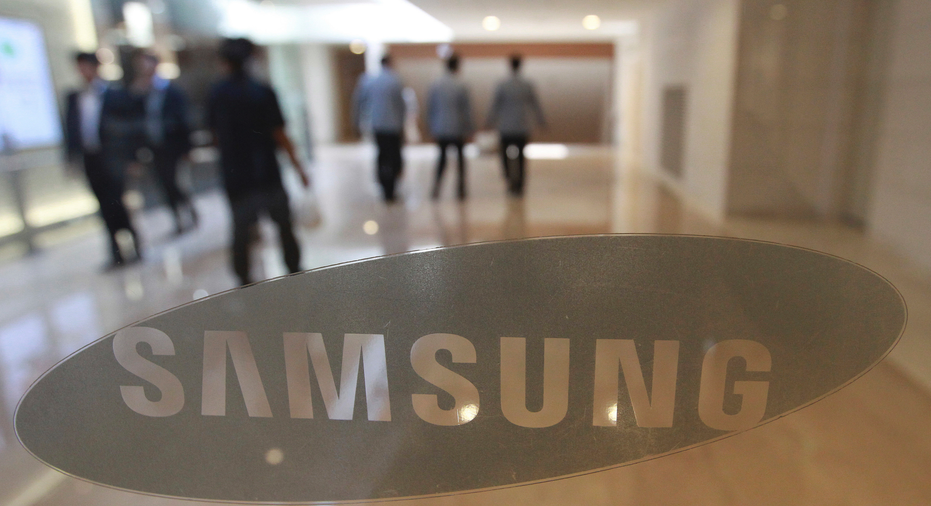Massive data growth fuels Samsung's record quarterly profit

SEOUL, South Korea – Samsung Electronics Co. said Friday its second-quarter operating profit soared to the highest in its history as massive data growth fueled a boom in the semiconductor sales and helped defy sluggish growth in the smartphone market and a slow recovery in the global economy.
In its earnings preview, the South Korean tech giant put its April-June operating profit at 14 trillion won ($12.1 billion), up 72 percent from 8.1 trillion won ($7 billion) a year earlier. Sales rose 18 percent to 60 trillion won ($51.9 billion).
The stunning result beats already-high expectations and puts Samsung on track to report the highest profit in its history for the full year. Analysts expected 13 trillion won ($11.2 billion) according to financial data provider FactSet.
Other milestones may be waiting. Samsung's quarterly profit could have surpassed Apple's for the first time, and Samsung's semiconductor revenue, which had been second to Intel's, likely surpassed the U.S. company in the second quarter, analysts said.
In the past, Samsung's financial performance mirrored the global economy or the cycles in the consumer electronics industry, such as how often users upgrade their televisions or smartphones.
That is no longer the case. Even as demand for smartphones that had fueled Samsung's profit has slowed, Samsung is on a roll because its memory chips are crucial for global tech companies in the era of explosive growth of data.
"To process and analyze big data, data storage comes first and this is the driving force behind Samsung's record-high profit," Hwang Min-sung, an analyst at Samsung Securities, said in a report. "Consumers' data usage exploded and companies are not saving their money to invest in servers for data storage and data analysis."
Global tech companies like Google, Amazon and Facebook are scurrying to add more servers for their databases to store, analyze and process the massive data generated from connected devices by consumers surfing the internet to stream videos and music, sharing and viewing photos and files online and using mobile applications. With the adoption of artificial intelligence and the arrival of the phenomenon called internet of things where auto vehicles, refrigerators and even mundane objects like toothbrushes can be connected to the internet and churn out data, companies will need even more microchips from Samsung that can handle even more data with speed and energy efficiency.
Analysts believe Samsung's semiconductor division, which makes the DRAM and NAND chips for mobile devices and servers, generated nearly 8 trillion won ($7 billion) during the three-month period, or 60 percent of the quarterly profit.
To put the explosive growth of Samsung's chip profit into perspective, that is close to what Samsung's semiconductor division used to earn for a full year. Its semiconductor division made 8.8 trillion won in operating profit for the full year of 2014.
Samsung is the world's largest supplier of memory chips and retains the most advanced memory chip production technology several years ahead of its rivals.
Analysts forecast Samsung's quarterly semiconductor profit will only rise in upcoming quarters because there are no rivals in sight that can catch up or invest in memory chip production as much as Samsung does.
The Suwon, South Korea-headquarter company is preparing to expand its chip capacity in South Korea while reviewing whether to add more production lines in China to meet demand. It plans to spend 20.4 trillion won ($18 billion) in the next four years to expand capacities of memory chips in its South Korean plants, it said earlier this week.
Another component that put Samsung ahead of its rivals: OLED screens. They are estimated to have generated about 1.1 trillion won ($952 million) during the last quarter.
OLED screens, advanced displays that display crisp, more saturated colors, are another cash-generating machine as smartphone makers are ditching the LCD screens and adopting the advanced displays for high-end smartphones. Samsung, which controls more than 90 percent of the global markets for mobile OLED, is using its own OLED screens for the curved displays of the Galaxy smartphones. Apple is widely expected to adopt OLED screens as well.
On the smartphone front, analysts said there will be neither surprise nor disappointment as the robust Galaxy S8 smartphones sales during the spring quarter appeared to have been offset by increased costs. Earlier in the day, Samsung began limited sales of the recycled Galaxy Note 7 smartphones, which were discontinued last year after they overheated and burst into flames.
Despite the stunning financial performance, it may not be a moment to party for Samsung.
Its de facto leader is in jail as part of the corruption scandal that topped South Korea's president.
Lee Jae-yong, Samsung Electronics vice chairman, is being tried on bribery and other charges alleging that he used Samsung funds to curry favor from the ousted president. The company, Lee and former President Park Geun-hye deny the allegations. Lee's court hearings are expected to wrap up next month. Park is being tried separately.
Some said the imprisonment of Lee may impede the company from making bold decisions that would prepare Samsung for the years ahead. The three chief executives who now oversee Samsung's component, mobile and TV businesses are not members of the company's founding family and may be reluctant to take big risks such as betting on a future technology.
Memory chips and OLED screens, the two cash generators that fueled Samsung's record profits and put the company years ahead of its rivals, both resulted from bold decisions years ago to invest money and effort into the technology.
__
Lee can be reached on Twitter: www.twitter.com/YKLeeAP



















